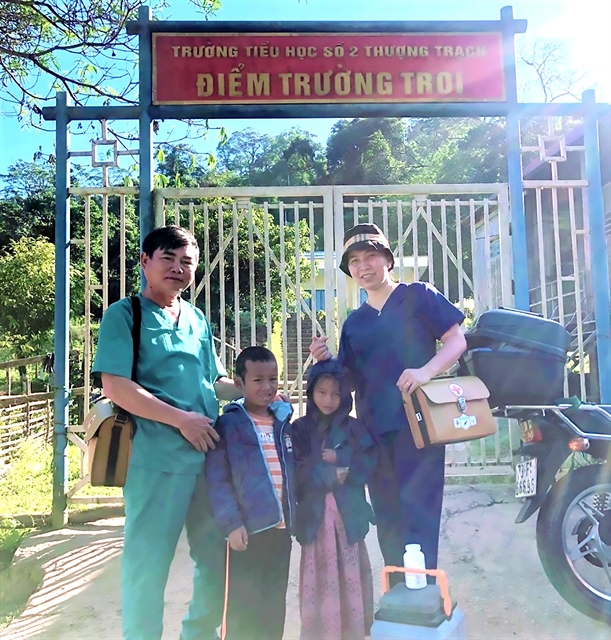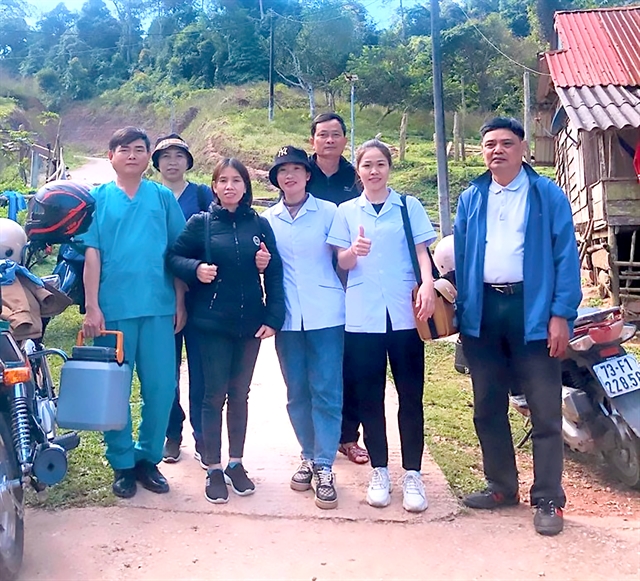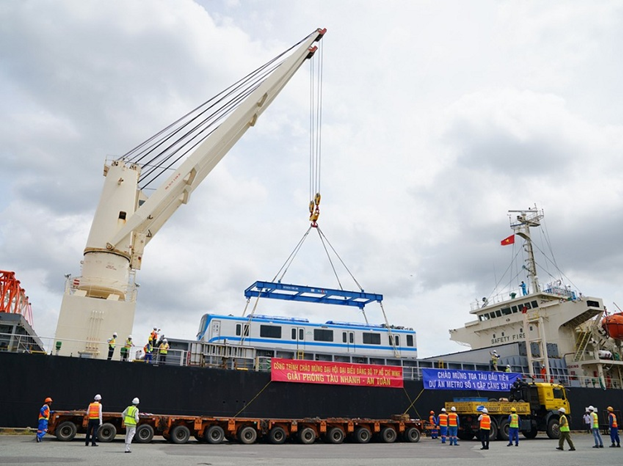 Society
Society

 |
| Nguyễn Thị Hoa, a medical worker at Thượng Trạch Commune’s health centre in the central province of Quảng Bình, goes to the village to give vaccinations to children. Photo suckhoedoisong.vn |
QUẢNG BÌNH – Forest trekking, stream crossing in the night, falling down and quickly getting up to continue helping the sick in emergency situations has become a daily routine for female medical workers in the border areas of the core region of Phong Nha – Kẻ Bàng National Park in the central province of Quảng Bình.
At Thượng Trạch Commune’s health centre in the core area of Phong Nha – Kẻ Bàng National Park in Bố Trạch District, female doctors have the duty of caring for the health of people from Bru – Vân Kiều and Chứt ethnic minorities in 18 villages.
These villages are scattered throughout the border area. The farthest village is more than 30km from the commune centre with difficult access. Most roads are rough and dirt with many rockslides, making it hard for medical workers to access to patients’ home and provide emergency treatment.
Midwife Nguyễn Thị Hoa still remembers one early morning in April 2021. When the roads to Cà Roòng 1 Village were thick with fog, the family of a pregnant woman came to find her in a hurried and worried state.
Upon hearing that the pregnant woman, after going into labour at home, showed signs of exhaustion and difficult delivery, Hoa promptly prepared medicine and her medical equipment, then got on a motorcycle to go to the village.
The family hurriedly drove along the rugged and rocky road. Hoa bounced up every time the wheel hit a pothole, holding tightly to the medical bag with one hand and trying to keep herself from falling off the bike with the other hand. When they reached a slippery downhill section, she had to walk because it was impossible to continue on the motorcycle.
"The downhill road was very slippery. Unfortunately, I stepped on a wet spot and slipped, rolling down from halfway. Despite the pain, I struggled to get up and went to the stream bank to wash my face and nose, and continued to the village," Hoa told Sức khỏe & Đời sống (Health & Life) online newspaper.
When Hoa managed to reach the house of Y Din, the mother-to-be, Y Din was in a critical condition with haemorrhage, unmeasurable blood pressure, and at a very high risk of death. Hoa quickly set up an IV drip and administered pain relief injections.
There was no phone signal in the village and the roads were difficult to traverse, so it was impossible to call for assistance or transport the mother-to-be to the health centre. Hoa knew that this would be a life and death battle for the mother and her unborn child, and she had to make all her efforts to save them.
“Fortunately, after all our efforts, both Y Din and her child survived the critical situation. We cannot blame the mother for not reaching the health centre because of the long and difficult journey,” she said.
“Luckily, we arrived just in time,” she added.
The journey to assist in the birth delivery was difficult, and returning to the health station was also memorable. After the delivery, the family of the mother-to-be was occupied, so there was no one to accompany Hoa back to the health centre. She decided to walk through the forest alone, concealing her fear while walking alone on the deserted forest road.
After walking for a considerable distance, she was able to hitch a ride from some villagers to get back to the health centre.
“It took me nearly a day to travel. When I returned to the station, my white blouse had turned red with the colour of the red soil. I was also damp from the bumps and falls while riding, but I was very happy to have saved two lives,” Hoa shared.
 |
| Nguyễn Thị Thu Hà (third from left) on a trip to the village for medical treatment. Photo suckhoedoisong.vn |
As a companion to Hoa in many delivery cases, population officer Nguyễn Thị Thu Hà has many unforgettable memories.
Hà recalled the case of a difficult birth late one night during the rainy season. She had to hit the road immediately to be on time.
The only way reach the mother-to-be’s home was to cross a stream where the water level was rising.
"It was very dangerous, but time was pressing, so we decided to cross the stream, clinging to the rocks to reach the patient's home as quickly as possible,” she said.
“Looking back now, I still feel terrified," she recalled.
Hoa and Hà said they skipped meals to rush to Cồn Roàng, A Ki, Cù Tồn villages at night to assist with difficult deliveries or help forest-goers who had fallen. On the dark forest road, the two women walked while encouraging each other. Every time they heard wild animals in the dark night, they felt a tightness in their chests.
"We were so scared during those midnight walks through the forest. The road was difficult, the sky was dark, we were afraid of falling and afraid of the darkness, but for the sake of the patients' lives, we had to try," Hà shared.
Reflecting on the hardships of medical workers in remote areas, Dr Phan Văn Huệ, head of Thượng Trạch Commune health centre, mentioned the female medical staff and their sacrifices when they have to be away from their families and children.
“They must rely on their husbands and their elderly parents to take care of their own children, so that they can stay and work here. They can only return to their hometowns occasionally, but they all encourage each other to complete their missions,” Huệ said. – VNS




